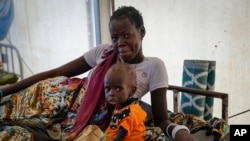The United Nations reports that up to 222 million people globally are facing acute hunger — and that 47 million of them in the Greater Horn of Africa.
Most parts of the region are battling the worst drought in 40 years. After four consecutive years of drought and a fifth season of failed rains looming, health experts fear great loss of life.
A new World Health Organization analysis of seven countries in the region finds disease outbreaks and climate-related emergencies have reached their highest level this century.
Analysts have recorded a total of 39 health emergencies this year in Djibouti, Ethiopia, Kenya, Somalia, South Sudan, Sudan, and Uganda.
Egmond Evers, the WHO’s Incident Manager for Greater Horn of Africa Food Insecurity and Health, said the food insecurity crisis in the region also is a health crisis, and that these twin disasters are interrelated.
“Malnourished people become sick more easily and sick people become malnourished more easily. The outcomes when disease and malnutrition are combined are much worse," he said. "We know this because the combination of cholera and malnutrition, measles and malnutrition, common childhood diseases and malnutrition — there is more severe disease and more death. We know globally already that 45 percent of all child deaths are linked to malnutrition.”
Evers said lack of food also leads to increased displacement. People who suffer from food insecurity, he said, leave their homes in search of something to eat. He notes this makes the region’s more than 18 million refugees and internally displaced people particularly vulnerable to illness and death.
“Displacement means interruption of life-saving health care, such as immunization, maternal and childcare, but also increased risks, such as poor water and sanitation, overcrowding, malnutrition, risky coping behaviors, and loss of life events," said Evers. "We are seeing that these public health events are becoming more common and the combination with increasing food insecurity and malnutrition, means they will also be more deadly.”
Drought is not the only extreme weather event in the region. In recent weeks, Sudan and South Sudan have been hit with widespread torrential rains.
The WHO said South Sudan is experiencing its fourth consecutive year of flooding; an estimated 40 percent of the country is under water.






